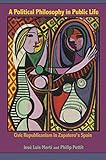A Political Philosophy in Public Life : Civic Republicanism in Zapatero's Spain / Philip Pettit, José Luis Martí.
Material type: TextPublisher: Princeton, NJ : Princeton University Press, [2012]Copyright date: ©2010Edition: Course BookDescription: 1 online resource (216 p.) : 1 line illusContent type:
TextPublisher: Princeton, NJ : Princeton University Press, [2012]Copyright date: ©2010Edition: Course BookDescription: 1 online resource (216 p.) : 1 line illusContent type: - 9780691154473
- 9781400835058
- 320.01 22
- JN8210 .M37 2010
- online - DeGruyter
- Issued also in print.
| Item type | Current library | Call number | URL | Status | Notes | Barcode | |
|---|---|---|---|---|---|---|---|
 eBook
eBook
|
Biblioteca "Angelicum" Pont. Univ. S.Tommaso d'Aquino Nuvola online | online - DeGruyter (Browse shelf(Opens below)) | Online access | Not for loan (Accesso limitato) | Accesso per gli utenti autorizzati / Access for authorized users | (dgr)9781400835058 |
Frontmatter -- Contents -- Preface -- 1. The Spanish Context -- 2. Civic Republican Theory -- 3. The Theory in Practice ? Spain 2004-8 -- 4. An Interview with Prime Minister Zapatero -- 5. Giving Philosophy a Public Life -- Notes -- References -- Index
restricted access online access with authorization star
http://purl.org/coar/access_right/c_16ec
This book examines an unlikely development in modern political philosophy: the adoption by a major national government of the ideas of a living political theorist. When José Luis Rodríguez Zapatero became Spain's opposition leader in 2000, he pledged that if his socialist party won power he would govern Spain in accordance with the principles laid out in Philip Pettit's 1997 book Republicanism, which presented, as an alternative to liberalism and communitarianism, a theory of freedom and government based on the idea of nondomination. When Zapatero was elected President in 2004, he invited Pettit to Spain to give a major speech about his ideas. Zapatero also invited Pettit to monitor Spanish politics and deliver a kind of report card before the next election. Pettit did so, returning to Spain in 2007 to make a presentation in which he gave Zapatero's government a qualified thumbs-up for promoting republican ideals. In this book, Pettit and José Luis Martí provide the historical background to these unusual events, explain the principles of civic republicanism in accessible terms, present Pettit's report and his response to some of its critics, and include an extensive interview with Zapatero himself. In addition, the authors discuss what is required of a political philosophy if it is to play the sort of public role that civic republicanism has been playing in Spain. An important account of a rare and remarkable encounter between contemporary political philosophy and real-world politics, this is also a significant work of political philosophy in its own right.
Issued also in print.
Mode of access: Internet via World Wide Web.
In English.
Description based on online resource; title from PDF title page (publisher's Web site, viewed 29. Jul 2021)


